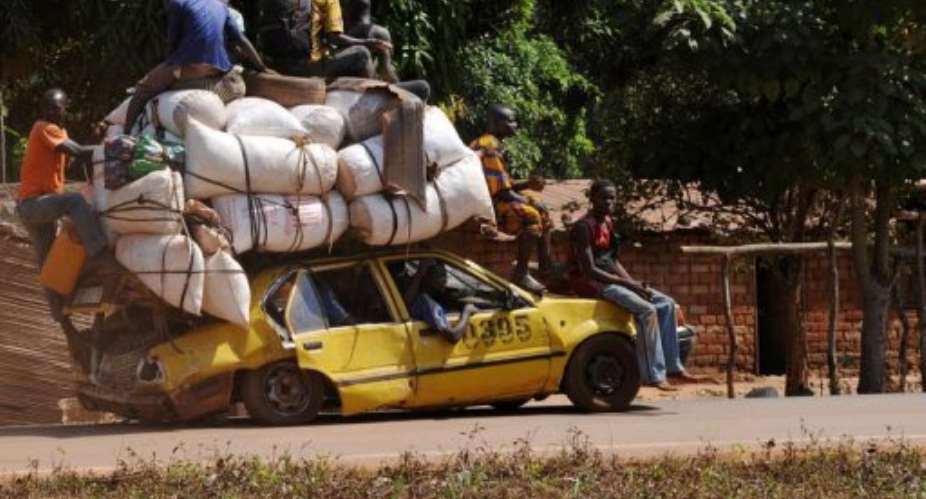BANGUI, Central African Republic (AFP) - Rights groups in the Central African Republic on Thursday accused both the government and rebels of committing abuses during a conflict that has seen the insurgents seize much of the country.
In a statement, the RONGDH network of rights groups said it "condemns the abuses committed in towns occupied by the Seleka (rebel) coalition, the looting of public and private property, the systematic disruption of communications in the said towns and cases of physical and sexual violence against the civilian population".
The groups also condemned government loyalists for setting up "illegal barricades" and "distributing knives and firearms in certain neighbourhoods of Bangui", the capital, and accused the authorities of making arbitrary arrests.
Civilian supporters of President Francois Bozize have taken to erecting roadblocks to prevent any rebel incursion in the capital, stopping vehicles to check whether the occupants speak Sango or French.
A national language, Sango is not spoken by the people of the north, a mainly Muslim region where the majority of the rebels come from.
Overnight Monday, a young Muslim questioned by these militias tried to escape and was shot dead by soldiers, setting off clashes in which a police officer was killed.
Deadly clashes have also been reported in areas under rebel control.
Residents of the central village of Ngakobo said Wednesday that four people had died -- two rebels and two civilians -- in clashes that broke out when villagers saw a group of rebels trying to loot a local sugar refinery.
The rights' group's statement came as both sides were held in check by an international intervention force.
The African Multinational Force in Central Africa (FOMAC), made up largely of Chadian troops as well as soldiers from Gabon, the Republic of Congo and Cameroon, has warned against crossing a "red line" at Damara, the last major town between the rebels and the capital.
The rebels have for now halted their offensive at Sibut, 160 kilometres (100 miles) from Bangui.
With both sides preparing for peace talks due to start in Gabon on Tuesday, Bozize's regime made its own allegations Thursday about the rebels and their leadership.
Territorial Administration Minister Josue Binoua accused the rebel alliance of consisting mainly of foreigners from Chad, Sudan and Libya, and of preaching a strict form of Islam.
"If some leaders of this rebellion are genuine Centrafricans, the same is not true of the majority of the troops, who very largely consist of the Toro Boro, Sudanese rebels from Darfur," Binoua told AFP and Radio France Internationale.
"There are residual forces of (Chadian rebel) Mahamat Nouri, who has been expelled from Khartoum. Plus other fighters of Libyan morphology," he added.
The Toro Boro in Darfur, a region in western Sudan bordering on Chad, and the Chadian rebels led by Nouri, have been largely inactive since relations improved between Chad and Sudan and peace accords were signed in 2010. Before then, Sudan and Chad regularly clashed through proxy rebel groups.
"This is why the government denounces with all its strength this movement by the rebels to a religious war. Our question remains intact, regarding their real aim and their real motive," Binoua added.
Bozize's government has several times alleged that the rebels are backed by foreign aggressors.
Bozize on Wednesday sacked his own son Jean-Francis from the post of defence minister and took personal charge of the portfolio.
According to a security source, Jean-Francis was "punished for his nonchalance" during a campaign in which government forces lost all their clashes with the rebels and had to be rescued by regional reinforcements.





 Western North been sidelined for far too long; address our needs before 2024 ele...
Western North been sidelined for far too long; address our needs before 2024 ele...
 Effutu: 'Stop eating at night and take care of your health' — Afenyo Markin advi...
Effutu: 'Stop eating at night and take care of your health' — Afenyo Markin advi...
 Akufo-Addo's desperate attempt to disrupt Yagbonwura's 1st year anniversary cele...
Akufo-Addo's desperate attempt to disrupt Yagbonwura's 1st year anniversary cele...
 Armed robbers attack, rob Sethi Brothers Ghana Limited in Tema
Armed robbers attack, rob Sethi Brothers Ghana Limited in Tema
 SML deal: We commend Manasseh for holding gov't to account, Akufo-Addo for not s...
SML deal: We commend Manasseh for holding gov't to account, Akufo-Addo for not s...
 Our recall invocation is in good faith to consider three key issues – Majority
Our recall invocation is in good faith to consider three key issues – Majority
 You’re inviting bad luck upon yourself if you use Indian hair — Spiritualist war...
You’re inviting bad luck upon yourself if you use Indian hair — Spiritualist war...
 Ejisu by-election: Police questions Kwadaso MP, two others over bribery allegati...
Ejisu by-election: Police questions Kwadaso MP, two others over bribery allegati...
 Nana Kwame Bediako is Nkrumah’s reincarnate; he’ll be president if he appoints N...
Nana Kwame Bediako is Nkrumah’s reincarnate; he’ll be president if he appoints N...
 Dumsor: Mahama gave us ‘dum, dum, dum’ but we are now in the era of ‘dum sie sie...
Dumsor: Mahama gave us ‘dum, dum, dum’ but we are now in the era of ‘dum sie sie...
